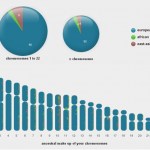personal genomics
Blaine Bettinger has an absolutely wonderful post where he compares his results for type 2 diabetes from 23andMe and DeCODEme.
I really liked his post and I appreciated the way he showed the data from the two companies and elaborated on their interpretation of his genotype and his risk.
Interestingly, his story goes beyond a simple relationship, where one base changes, one amino acid changes, and voila! you've got the disease.
Bettinger describes what happens when there are changes in multiple genes and how those changes can have a cumulative effect on evaluating the risk of developing a…
Apparently there'll be a new Skip Gates documentary on personal genomics on PBS, Faces of America.
Over at Genetic Future Dr. Daniel MacArthur points out some errors in deCODE's interpretation services. Dr. MacArthur presumably knows his maternity, though if the X chromosome results were correct one would guess that Dr. MacArthur is actually adopted and that his mother might be a Lumbee Indian.
But it makes me wonder how confused people are going to be due to problems with false results. In particular, as these technologies become very cheap many families with make recourse to them. Sometimes this will highlight "extrapair paternity events," but sometimes there will be errors and…
I'm currently playing around with my 23andMe data in the deCODEme browser.
deCODEme's (apparently new?) Relationship Check feature, which appears to be a targeted version of 23andMe's Relative Finder algorithm, allows users to compare their genetic data to other profiles in the database and calculate the probability of a familial relationship.
My comparison with notoriously cranky deCODE CEO Kari Stefansson (pictured, left) gave me this reassuring result:
Phew!
On Twitter, genetic genealogist extraordinaire Blaine Bettinger noted that deCODEme appears to have also introduced a brand…
Late last week I noted an intriguing offer by personal genomics company deCODEme: customers of rival genome scan provider 23andMe can now upload and analyse their 23andMe data through the deCODEme pipeline.
On the face of it that's a fairly surprising offer. As I noted in my previous post, interpretation is what generates the real value for personal genomics companies, so giving it away for free seems a bizarre approach to business - especially for a company living on the edge of a financial precipice. However, I also argued that the intention here is likely to be to generate an opportunity…
A curious tweet this morning from personal genomics company deCODEme, barely a few weeks after the declaration of formal bankruptcy of parent company deCODE Genetics:
@decodegenetics: Migrate to deCODE this winter! Upload your genetic data for free. http://www.decodeme.com/data-upload
Here's a description of the service from the URL in the tweet:
deCODEme wants to give even more people the chance to enjoy the best in personal genomics. Our bioinformatics team has just launched a simple system to enable existing customers of 23andMe⢠to migrate their data into deCODEme and to join our…
Misha Angrist has a very brief but eloquent rant in response to the genomics nay-sayers in this Nature News piece on the bankruptcy of deCODE Genetics.
Here's a taste:
I agree: GWAS is of limited value and this probably contributed to deCODE's demise. But whatever deCODE's fate, if whole human genomes can be sequenced for < $2000, isn't it about time we stopped kicking GWAS's ever-stiffening corpse? Second, just because something is not a medical necessity, does it follow that it is worthless?
Here's the rest.
Subscribe to Genetic Future. Follow Daniel on Twitter
European Genetics and Anthropology has a neat little tutorial that may be of interest for genetic hobbyists: it provides instructions on how to run the program STRUCTURE on your own genetic data generated by a personal genomics company such as 23andMe or deCODEme.
STRUCTURE is an extremely popular tool among researchers working in population genetics, which allows you to generate plots showing estimates of the proportion of an individual's genome belonging to different population clusters.
The tutorial on the blog shows you how to run your analysis using a subset of just 125 markers…
I was just sent this email by a deCODEme customer:
As a valued subscriber to deCODEme, we wanted to write to you directly to
let you know about some important developments in the company and how we
believe these will underpin our ability to continue to keep you in the
forefront of understanding what the latest advances in genetics mean to you.
For the past several months, deCODE has been working on restructuring its
operations. One of the principal goals of this effort has been to enable us to
find new investment that will continue our work in human genetics and to offer
to our customers…
Struggling Icelandic biotech deCODE Genetics has finally reached the point of formal insolvency. A press release today announces that the company has filed for chapter 11 bankruptcy in a US court:
In a filing with the U.S. Bankruptcy Court for the District of Delaware late on Monday, deCODE listed total assets of $69.9 million and total debt of $313.9 million, as of June 30.
deCODE launched in 1996, basing its business plan on its unique access to biological samples and genealogical and medical records from the small, homogeneous Icelandic population. Since its launch it has proved wildly…
Changes in the world of personal genomics. Dan MacArthur has the details on 23andMe changing up its offerings, perhaps signalling that the money gush is long over. And deCode is finally dead. Of course, just because the .com bubble burst doesn't mean that the internet is no longer a part of our lives. New players will likely emerge in the wake of this creative destruction, and old players will adapt to survive.
Added in edit: for superb analysis of the announcement from multiple angles, you should also check out Dan Vorhaus' three incisive articles on Genomics Law Report.
Personal genomics company 23andMe announced yesterday on its blog (and in an email to customers) of impending changes to its product line. Until now 23andMe has offered only two products: its $399 full scan, and a $99 Research Revolution product that offers limited functionality and a focus on common disease risk prediction.
There are two major components of the altered product line. Firstly, customers will now be able to…
Medland et al. (2009). Common Variants in the Trichohyalin Gene Are Associated with Straight Hair in Europeans. The American Journal of Human Genetics DOI: 10.1016/j.ajhg.2009.10.009
A couple of weeks ago I reported on a presentation by 23andMe's Nick Eriksson at the American Society of Human Genetics meeting in Honolulu, in which Eriksson presented data on a series of genome-wide association studies performed by the company using genetic and trait data from its customers.
Along with genetic analysis of a variety of other traits (such as asparagus anosmia and photic sneeze) Eriksson…
It's been an intensive week of genomics here at the American Society of Human Genetics meeting, and I haven't been able to grab time to blog as much as I'd have liked. In fact there's a whole load of genomics news I'll be trying to cover in some detail over the next couple of weeks; for the moment, though, I couldn't let today's presentation from personal genomics company 23andMe go by without at least some comment. (For other coverage of the conference, do check out Luke Jostins' blog coverage and the stream of live analysis on Twitter.)
The 23andMe presenter (Nick Eriksson) delivered an…
Details are pretty sketchy, but a press release announced today suggests that personal genomics company 23andMe has performed a genome-wide association study comparing 100 current or former professional NFL players with a set of controls of unspecified sample size.
The shocking result:
The study did not find the tested players to be genetic outliers, suggesting that genetics may not be a good predictor of athletic success.
It's unsurprising that the results of this study are negative (more on this below), but the conclusions they draw from this are fallacious. In fact we know from twin and…
Four scientists - including the omnipresent J. Craig Venter (left) - have penned an opinion piece in the latest issue of Nature based results from five individuals genotyped by two separate personal genomics companies. The article highlights some deficiencies in the way that genetic data are currently used by direct-to-consumer companies to generate risk predictions and to present them to customers.
The identity of the tested individuals isn't made explicit in the article, except to note that there were two males and two females from the same family and one unrelated female. All of the…
I asked readers to fill out a survey a week and a half ago. Results are in.
Mark Henderson's interview with Anne Wojcicki, co-founder of personal genomics company 23andMe, is well worth a read. The big story is this: Wojcicki has floated the possibility of offering discounted genome scans to clinicians "to teach them to interpret genomic information that is now readily available to their patients".
Wojcicki explains:
"Clearly we need to engage with physicians to help them to understand this information," she said. "One of the things we've talked about is we'd love to get physicians comfortable with their own genomes first, have them understand what does it mean,…
In the second of three guest posts, lawyers Daniel Vorhaus and Lawrence Moore of the superb blog Genomics Law Report discuss the implications for personal genomics customers if their provider goes bankrupt. In part one of the series (posted yesterday), Vorhaus and Moore dissected the implications of the privacy policies of two personal genomics companies, TruGenetics and 23andMe.
Today's post is an in-depth analysis of the complex legal issues surrounding the treatment of genetic information gathered by a now-bankrupt personal genomics company. For those who get a little lost in the legal…
In this series of three guest posts, lawyers Daniel Vorhaus and Lawrence Moore of the excellent Genomics Law Report provide insight into the intriguing question of what happens to customers' genetic data in the event that a personal genomics company goes out of business. Part II and III of this series will be posted over the next two days.
What Happens if
a DTC Genomics Company Goes Belly Up?
Direct-to-consumer (DTC) genomics
companies are not immune to the current recession. When TruGenetics,
a new player in the DTC genomics space, announced in June that it would
be handing out 10,000…

